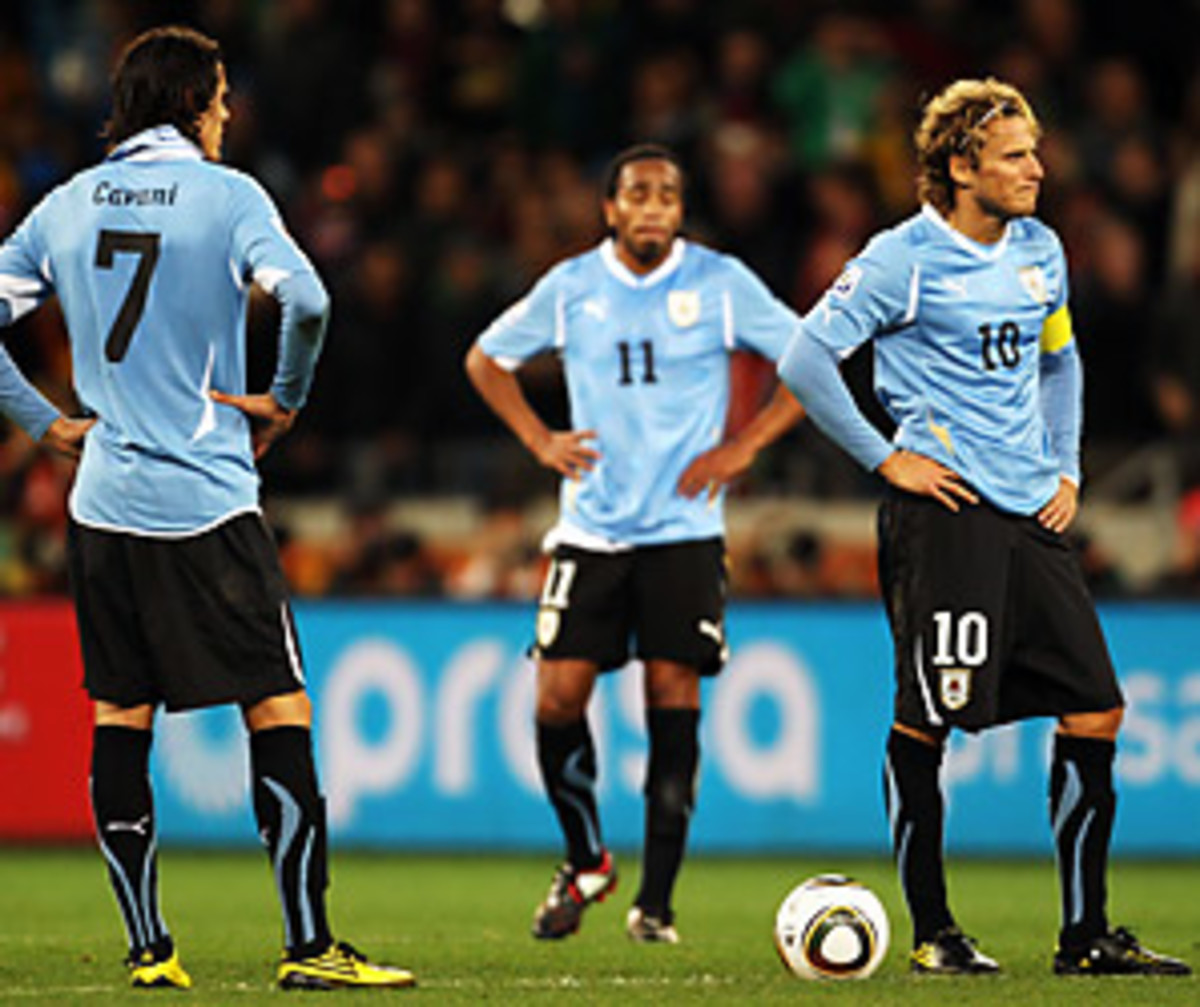Credit Uruguay for unheralded run
Five postgame thoughts on Uruguay after its 3-2 loss to the Netherlands in the World Cup semifinals on Tuesday:
1. Uruguay deserves more credit than it has received: Uruguay coach Oscar Tabarez got it right when he said that his team felt like it was at a party no one had invited it to. It did not help that Uruguay beat South Africa in group play and then, in highly controversial circumstances, knocked out the last African team left in the competition, Ghana, in the quarterfinals. It also provided this competition with its first red card, Nicolas Lodeiro on the first day, and reached the semifinal without beating a team higher in the FIFA rankings (Uruguay is 16th). But it was the reaction of Luis Suarez, the villain against Ghana, that did most to harm its public image. He was carried on the shoulders of his teammates and credited his intervention with "The Hand of God" label.
However, Uruguay has been punching well above its weight in South Africa. Its population is only 3.5 million, less than the capital cities of the last three teams it faced before the semifinal (Ghana, Accra, 3.8 million; South Korea, Seoul, 10.3 million; Mexico, Mexico City, 8.4 million), while North Korea's Kim Jong-Hun is the only coach paid less than Tabarez at the tournament. "El Maestro," as the coach is called, has been unable to pick the same defense for two games running, and has changed formations from game to game. Its football style is no more physical than the Netherlands', as Mark van Bommel proved in the run-up to the opening goal, and yet the pre-match billing cast the teams as good (Holland) versus evil (Uruguay). The Netherlands' controversial second goal will no doubt be seen as some kind of retribution for the Suarez incident. That's unfair to Uruguay, a true underdog that brought a great deal to the tournament.
2. Diego Forlan worked out the Jabulani long ago: Uruguay's captain for this game has scored four goals this tournament and three of them have come from outside the penalty box (the other was a penalty against South Africa). The last time he scored at a World Cup, against Senegal back in 2002, it was also from long range. Strangely, this one was his first against non-African opposition and his first with his left foot. He also has a better shooting accuracy from outside the box (73 percent) compared to inside (33 percent) and has joined Pedro Cea and Juan Schiaffino as Uruguay's second-highest World Cup scorer of all time, behind 1950 hero Oscar Miguez.
Without his usual strike partner, Suarez, Forlan found it harder to get into the game. But he emerged before halftime, taking advantage of his free role to drop deep and emulate Gio van Bronckhorst's long-range opener to tie the game at 1-1.
Forlan has been outstanding this World Cup. In a tournament in which outstanding individuals have been in short supply, he has been one of the best and surely deserves a top-five place in the newly formed FIFA Ballon D'Or awards later this year. He did score 28 goals for Atletico Madrid last season, including the winning goals in its Europa League semifinal and final success. He said last week that he had no intention of leaving Atletico this summer, but the club may find it hard to turn down a big offer if, as now seems likely, one comes along.
3. Uruguay missed Diego Lugano more than Luis Suarez: Suarez was the striker whose suspension was meant to leave Uruguay lightweight in attack, and it did, to an extent. But a bigger loss was its captain, Lugano, who was sidelined with a knee injury. It was no coincidence that Ghana's opening goal in the last round came within minutes of Lugano's limping off after 38 minutes, and the back line wobbled through the rest of that match. On Tuesday, Uruguay's defense looked robust enough in the first 45 minutes, but as Holland pushed forward in the second half, the fullbacks were increasingly pulled out wide, leaving the center backs more exposed. That led to Holland's third goal, as Dirk Kuyt skipped down the left and Arjen Robben sneaked into space left by Diego Godin to head it home.
4. Did Diego Forlan come off too early? Tabarez has not made too many bad decisions in the last month, but taking off chief goal-scoring threat Forlan with 10 minutes left might have been premature. Forlan did look shattered as he trundled off to a deserved ovation, and he may have picked up an injury before then, but when Maxi Pereira scored to make it 3-2 with three minutes left, Uruguay was left short in attack. Yes, Sebastian Abreu had come on, but with Edinson Cavani a shadow of the player we saw in earlier rounds, the South Americans' goal threat was diminished. Mauricio Victorino wasted no time in joining the attack as well, and Uruguay did have one shot that was bravely blocked in that frenetic late surge, but it was too little, too late.
5. This was Uruguay's chance of a lifetime -- at least until 2030: Uruguay was the first World Cup champion, in 1930, won it again in 1950, reached the semifinals in 1970 and the last 16 in 1990. It appears that this is a nation working on a 20-year cycle of success, in which case, now is the time to back the Uruguayans for 2030. On a serious note, this is a side that needed a playoff to qualify for South Africa, had no pre-tournament friendlies for fear of burnout, yet took advantage of a decent draw in the half without an outstanding team in it. For 10 minutes in the second half Tuesday, Uruguay still had a foothold in this match. That in itself is a sign of how close the Uruguayans came, though it will be of little consolation to them now.






